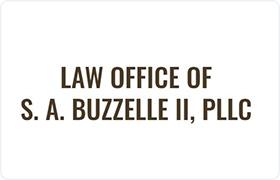Tempe Bankruptcy & Debt Lawyer, Arizona
Sponsored Law Firm
-
 x
x

Click For More Info:
-
Law Office of S.A. Buzzelle II, PLLC
14050 N 83rd Avenue Suite 290 Peoria, AZ 85381» view mapBankruptcy & Debt Law Your Trusted Bankruptcy Attorney
If you are in need of legal services for matters relating to bankruptcy and divorce, rely on Law Office of S. A. Buzzelle II, PLLC in Peoria, AZ.
800-873-4991
Alison C. Briggs
✓ VERIFIED *Status is reviewed annually. For latest information visit hereAlison Briggs is very knowledgeable and efficient. She really cares about her clients needs. No situation is ever too difficult for her to handle. Mis... (more)
Walter E Moak
✓ VERIFIED *Status is reviewed annually. For latest information visit hereThe Moak Law Firm is dedicated to helping the people of Arizona. Our team is diligent, hard-working, and committed to you and your needs. We offer rea... (more)
Brad A Denton
✓ VERIFIED *Status is reviewed annually. For latest information visit hereBrad represents primarily small businesses, and so he practices primarily in the areas of law that small businesses need. As a practical matter, Brad ... (more)
Sean Robert Forrester
✓ VERIFIED *Status is reviewed annually. For latest information visit hereSean Forrester, managing attorney at Lerner and Rowe Law Group, has made a career advocating for the rights of the citizen accused. Mr. Forrester has ... (more)
Carl R Retter
✓ VERIFIED *Status is reviewed annually. For latest information visit hereCarl is able to provide unique focus to every case. There is no “middle-man” – you speak directly with him, ensuring no case details are lost in... (more)
Bert Roos
✓ VERIFIED *Status is reviewed annually. For latest information visit hereBert L. Roos, Personal Counsel is an attorney whose practice is primarily in the area of family law, such as Divorce, Child Custody, Child Support, Sp... (more)
Martin J. Berkley
FREE CONSULTATION
CONTACTGuy P Roll
FREE CONSULTATION
CONTACTDan Gukeisen
FREE CONSULTATION
CONTACTBenjamin Wright
FREE CONSULTATION
CONTACT Stanley A. Buzzelle II Peoria, AZ
Stanley A. Buzzelle II Peoria, AZ Practice AreasExpertise
Practice AreasExpertise





